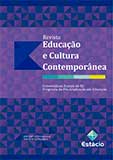Uma problematização sobre o conceito de exclusão-inclusão social na obra de Paulo Freire
DOI :
https://doi.org/10.5935/2238-1279.20190048Résumé
Paulo Freire propõe um olhar tanto quanto para as práticas pedagógicas inseridas nos processos sociais como para os próprios processos sociais, tal que se constituam relações pedagógicas em prol da construção de novos saberes e práticas. Nesse contexto, ganha centralidade a vocação do "ser mais", na qual os sujeitos imersos em sua situação de opressão compreendam seu papel e venham a problematizar a respeito de novas maneiras de viver a sua existência e ao refletirem sobre essas novas formas busquem transformar o meio em que vivem. Fundamentado no pensamento educacional de Paulo Freire, tem-se como intenção, a partir de um estudo descritivo crítico, elencar pressupostos que demonstrem a relevância dos conceitos de opressão e libertação em relação às categorias exclusão e inclusão. Na primeira parte do texto, argumenta-se que os seres humanos ditos excluídos ou marginalizados, são aqueles oprimidos cuja realidade é viver a violência criada por uma estrutura desumanizante. Reflete-se que mesmo ditos marginalizados esses sujeitos fazem parte do próprio sistema de desumanização e não estão fora desse. Na segunda parte, com o foco voltado para a educação, percebe-se não a necessidade de incluir esses sujeitos no modelo de sociedade existente, mas que se faz urgente transformar radicalmente essa mesma estrutura de tal forma que reconhecer esse pertencimento promova aos educandos/oprimidos o exercício de perceberem as suas responsabilidades de ação em prol da humanização no contexto vivido. Sustentado nessas ideias, problematiza-se que os conceitos de opressão e libertação se fazem adequados a discussão em questão, em detrimento do binômio exclusão-inclusão. Palavras-chave: Educação; Transformação social; Libertação; Pensamento freiriano. Abstract Paulo Freire proposes a reflection as much as for the pedagogical practices inserted in the social processes as for the own social processes, such that pedagogical relations are constituted in favor of the construction of new knowledge and practices. In this context, the vocation of being more becomes central, in which the subjects immersed in their situation of oppression understand their role and come to question about new ways of living their existence and reflecting on these new ways of living try transform the environment in which they live. Based on the educational thinking of Paulo Freire, it is intended as a critical descriptive study to define assumptions that demonstrate the relevance of the concepts of oppression and liberation in relation to exclusion and inclusion categories. In the first part of the text, it is reflected that the so-called excluded, marginalized human beings are those oppressed whose reality is to live the violence created by a dehumanizing structure. It is understood that even these marginalized subjects are part of the dehumanization system itself and are not outside it. In the second part, with the focus on education, it is understood not the need to include these subjects in the existing model of society, but that it is urgent to radically transform the same structure in such a way that recognizing that belonging promote the students/oppressed the exercise of realizing their responsibilities of action in favor of humanization in the lived context. Based on these ideas, it is argued that the concepts of oppression and liberation become adequate to the discussion in question, to the detriment of the exclusion-inclusion binomial. Keywords: Education; Social transformation; Liberation; Freire's thought.Téléchargements
Publié-e
Numéro
Rubrique
Licence
Ao submeter um artigo para publicação na Revista Educação e Cultura Contemporânea, o (s) autor(es) concordam com os seguintes termos:
I. O(s) autor(es) e o(s) eventual(is) coautor(es) conhecem e declaram concordar com as políticas editoriais da revista para a publicação de artigos e com os termos e diretrizes a seguir;
II. Os autores garantem que o trabalho não foi publicado anteriormente em meio eletrônico ou impresso, tampouco encaminhado para publicação em língua portuguesa em outros periódicos. Também asseguram que todos os autores participaram na elaboração intelectual de seu conteúdo;
III. Os artigos publicados representam, exclusivamente, a expressão do ponto de vista de seus autores e não a posição da Revista Educação e Cultura Contemporânea ou do Programa de Pós-Graduação em Educação da Universidade Estácio de Sá;
IV. É responsabilidade do(s) autor(es) assegurar que o manuscrito não contenha elementos que revelem sua identidade, garantindo a revisão cega durante o processo de avaliação por pares. Para isso, devem ser adotadas as seguintes medidas: remover nomes de autores, afiliações institucionais e quaisquer informações pessoais do corpo do texto e das notas de rodapé; substituir referências à própria produção por termos neutros, como “Autor(a)” ou “Autor(a), ano”, evitando citações que permitam a identificação; nomear o arquivo de submissão de forma neutra, sem mencionar o nome do(s) autor(es); e excluir metadados do documento que possam identificar a autoria (ex.: propriedades do arquivo em editores de texto).
V. O responsável pela submissão deve certificar-se do preenchimento completo e correto das informações de todos os colaboradores, conforme solicitado no sistema de submissão, incluindo: nome completo, filiação institucional atualizada, e-mail, link para o currículo Lattes (para participantes brasileiros), ORCID e minicurrículo;
VI. O(s) autor(es) comprometem-se a submeter o manuscrito utilizando exclusivamente o template oficial disponibilizado pela Revista Educação e Cultura Contemporânea (REEDUC), assegurando o cumprimento integral das normas de formatação exigidas. Isso inclui a padronização de margens, fonte, espaçamento, estilo de citações e referências bibliográficas, conforme descrito nas Diretrizes para Autores. Submissões fora do padrão estabelecido poderão ser rejeitadas ou devolvidas para ajustes antes do encaminhamento à avaliação por pares.
VII. Caso tenha sido utilizado algum recurso de inteligência artificial (IA) durante a elaboração do manuscrito, o(s) autor(es) deve(m) declarar esse uso, seguindo as orientações do template e da seção "Declaração de Direito Autoral", disponíveis nesta página.





